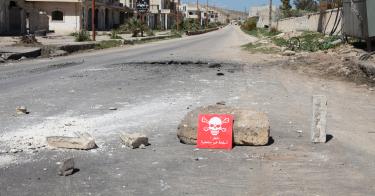From the demise of ISIS leader Abu Bakr al-Baghdadi to the Turkish offensive against Kurdish forces, Syria has been in the news recently and often. What hasn’t made headlines much is Damascus‘ continuing possession and use of chemical weapons. And that’s something that shouldn’t be forgotten.
The regime of Bashar Assad has a long history of using chemical weapons — one that started even before the Aug. 21, 2013, attack on Syrians living in the Ghouta district just outside Damascus. The regime’s release of sarin gas — a highly toxic nerve agent — reportedly killed more than 1,400 people and injured thousands more.
Mr. Assad still has the capability — and, apparently, the willingness — to use chemical weapons against his fellow Syrians. The U.S. State Department reports that he used another deadly chemical weapon — chlorine gas — this May in an assault on insurgents in Idlib province.
Though even one chemical weapon attack is one too many, these aren’t the only two incidents of chemical weapons being used by the regime. It is estimated that during Syria’s more than eight-year civil war, Damascus has used them at least 50 times — and perhaps as many as several hundred times.
Syria’s deep embrace of these horrific agents is troubling for many reasons.
First, there is the human tragedy associated with the use of a weapon of mass destruction against innocent, defenseless civilians.
Next, there’s the fact that Syria is a signatory to the Chemical Weapons Convention. Its repeated violations weaken the force of that arms control treaty, as well as the long-standing, widely accepted international norm decrying the use of chemical weapons.
Syria has used these weapons with limited accountability. (The U.S. conducted a retaliatory raid in April 2017 and another a year later — that time in concert with British and French forces.) Every time Syria launches a chemical attack, it increases the chances of other state and non-state actors following suit — perhaps against U.S. forces, allies, and partners.
Syria’s continuing use of chemical weapons is an egregious violation of international norms, treaties, and law, a threat to international peace and security, and an affront to humanity.
Full accountability for this behavior may be a long time coming, but it’s critical that the U.S. and like-minded partners take steps to deter and, if possible, deny Syria’s future use of chemical weapons.
To that end, the Trump administration must publicly keep open the military option for responding to Syria’s possession or use of chemical weapons. That includes the option of striking high-value political targets not related to the regime’s chemical weapons program.
The administration should also continue to highlight Syria’s crimes in international venues and forums, including the U.N. Security Council. And it should support international efforts at greater accountability for Mr. Assad. For example, Washington should encourage potential foreign reconstruction providers to withhold aid to Syria until Damascus comes into full compliance with the Chemical Warfare Convention, including verifiable chemical weapon disarmament.
In addition, the administration should work to improve international export controls to inhibit Syria’s ability to produce more chemical weapons. And it must ensure that U.S. forces deployed to Syria are prepared to operate successfully in a chemical warfare environment.
All of these efforts would help reinforce the international rejection of chemical weapons use, perhaps deter other bad actors on the world stage — Iran and Hezbollah come immediately to mind — from pursuing and using such heinous arms.
There have been far too many horrors in the Syrian civil war, a conflict which has tragically consumed hundreds of thousands of lives. The regime’s use of chemical weapons is just one of the unspeakable nightmares it has spawned.
Nevertheless, it’s a horror that should never be repeated again — anywhere. Holding Syria accountable for its chemical-weapons crimes is a critical step in moving toward any hope of achieving that important goal.
This piece originally appeared in The Washington Times



